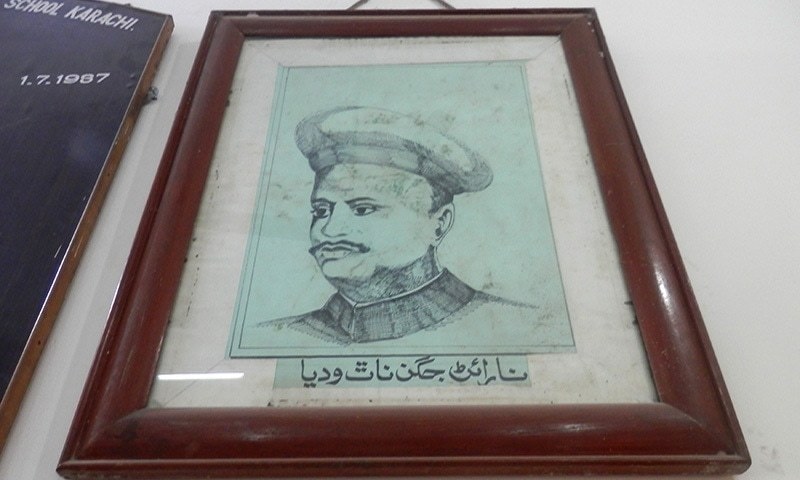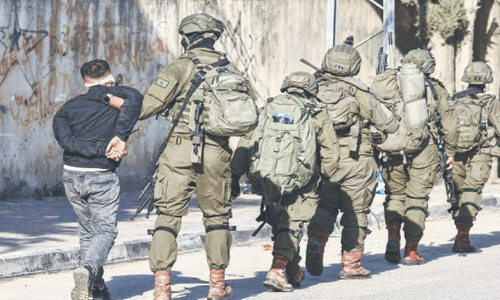If you went around in Karachi asking various students which education institutes they studied in, most would reply in acronyms like NED, DJ, DCTO and so on. Recently, just before summer break, my nephew and I happened to visit one such institute, the NJV School in Karachi.
We arrived at the school to find it largely empty of students. There were a few children playing cricket in the playground, but all the classrooms were empty.
I approached a young boy and asked what NJV meant.
“NJV means NJV, what else?” he replied.
I realised it would be pointless to ask him any further questions about the history of the institution.
If one is not aware of the history of their academic institute, does it not hamper the process of being educated? However, and unfortunately so, the bond that should exist between a student and the institution is mostly absent. I thought it worthwhile, therefore, to learn something about this famous school of Karachi.
The NJV School is named after Maharaj Jagan Nath Vidya. According to the Gazetteer of the Province Sind, Karachi District (compiled by J.W. Smith, published by Indus Publications), Narain Jagan Nath High School was the first public school to be opened in Sindh. It was inaugurated in October, 1855. The first batch had 68 students.
 |
The building was located where the Bandar Road and the Mission Road met. The map was made by a Lieutenant Chapman and paid for by the Karachi Municipality and the government.
In 1876, the school was relocated to its current location. The new building had 17 classrooms. There were a total of 477 students in the school. Out of them, 350 were Hindu, 32 were Brahmans, 10 were Jains, 12 were Muslim, 66 were from the Parsi community and seven were Indian Jews.
Narain Jagan Nath was an educated resident of Mumbai. He is said to be a well-known educationist of his days. That, too, at a time when books and teachers were a rarity in Sindh.
In 1910, another high school was established in Sindh. It accommodated 250 students. The school received a monthly grant of 4,020 rupees.
On November 16, 1987, Department of Education, Government of Sindh received a letter. It had recommendations for improvement of the educational facilities in the NJV Government Higher Secondary School (Sindhi Medium) Karachi. Following are the contents of that letter:
“NJV Government Higher Secondary School (Sindhi Medium) is the first and oldest public educational institute in the province. It was founded in 1855 with only 68 students. In 1945-46, the school was shifted to the kotwaal building for some time. It was finally moved to its current building, the previous Sindh Assembly building.
“Being the first educational institute of the province, the school has certainly played a vital role in providing the people of Sindh with the services of education. It has remained a centre of learning and curricular activities. The school has seen its days of glory and fame. Many renowned and successful politicians and scholars have acquired their higher secondary education from this school. No doubt that the school has lost its charm due to encroachments. Its front yard houses government offices. The time will come when the school will regain its lost glory and recognition. What is needed is the education department’s attention.”
Read on: As a piece of Karachi’s academic history falls apart, officials look away
It was also mentioned in this letter that if the government offices located in the school premises were moved elsewhere, the school's strength could exceed 300.
 |
 |
The school also has historical importance owing to the fact that after partition, the Sindh provincial assembly convened in its building. Syed Mustafa Barelvi writes about the NJV School on page 105 of his book Musalmaanan-e-Karachi-o-Sindh Kee Taalem (Az Ahd-e-Qadeem Taa Qayaam-e-Pakistan):
“In March 1917, 477 students were receiving an education in this school. The number of Muslim students was only 12. The number highlights the weak situation of the Muslims of Karachi and Sindh in higher education.”
The division of the number of Hindu students into Brahmins and non-Brahmins clearly tells a discriminative tale.
Zulfiqar Wahucho, a journalist who put a lot of effort into revamping the NJV School, acquired a school bus for the students commuting from afar. It wasn’t an easy acquisition. And it was followed by the problem of arranging fuel for the bus. According to him, even today, the number of students is around 300.
It is a matter of grave concern why the number of students has not exceeded 300 even after more than a century and a half.
 |
Some of the well-known students of the school include Amar Jaleel (a famous Sindhi literato), Pir Mazharul Haq (the former provincial education minister), Shafi Muhammad Jamot (current provincial legislator), and Hassan Mansoor (a renowned journalist). Hashmat Tehelram Keval Ramani, a famous personality in Sindh, also studied here once.
See: Hashmat Kevalramani: Pakistan's first exiled man
Up until 1946, all the headmasters of the school were non-Muslims, whereas afterwards, it has only been Muslims.
To repeat a clichéd statement, other societies preserve such historical institutions and establish chairs in the name of the renowned scholars who graduate from those institutions. They also take pains to develop such institutions with time. Although the provincial authorities are working on renovating and developing some old institutions in Karachi, no such thing is happening for the NJV School.
—All photos by author
Translated by Aadarsh Ayaz Laghari from the original in Urdu here.

































